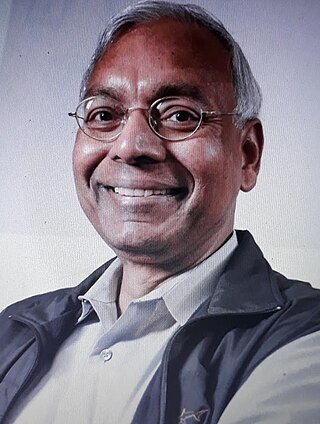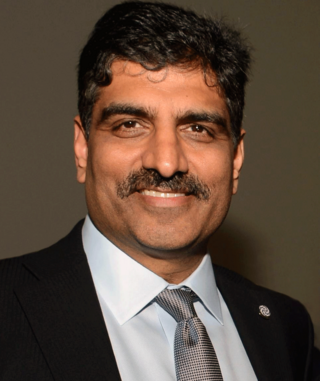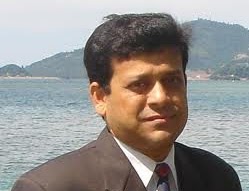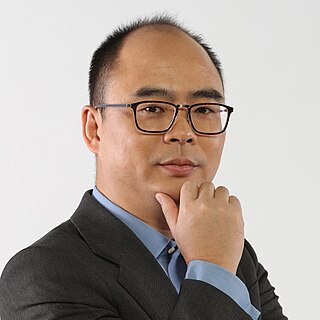
Jack Joseph Dongarra is an American computer scientist and mathematician. He is a University Distinguished Professor Emeritus of Computer Science in the Electrical Engineering and Computer Science Department at the University of Tennessee. He holds the position of a Distinguished Research Staff member in the Computer Science and Mathematics Division at Oak Ridge National Laboratory, Turing Fellowship in the School of Mathematics at the University of Manchester, and is an adjunct professor and teacher in the Computer Science Department at Rice University. He served as a faculty fellow at the Texas A&M University Institute for Advanced Study (2014–2018). Dongarra is the founding director of the Innovative Computing Laboratory at the University of Tennessee. He was the recipient of the Turing Award in 2021.

Sankar Kumar Pal is a computer scientist and the president of the Indian Statistical Institute (ISI), Kolkata. He is also a National Science Chair, Government of India. Pal is a computer scientist with an international reputation on pattern recognition, image processing, fuzzy neural network, rough fuzzy hybridization, soft computing, granular mining, and machine intelligence. He pioneered the development of fuzzy set theory, and neuro-fuzzy and rough-fuzzy computing for uncertainty modelling with demonstration in pattern recognition, image processing, machine learning, knowledge-based systems and data mining. This has made him widely recognized across the world and made India a leader in these disciplines in international scenario. He founded the Machine Intelligence Unit in 1993, and the Center for Soft Computing Research: A National Facility in 2004, both at the ISI. In the process he has created many renowned scientists.

Eduardo Daniel Sontag is an Argentine-American mathematician, and distinguished university professor at Northeastern University, who works in the fields control theory, dynamical systems, systems molecular biology, cancer and immunology, theoretical computer science, neural networks, and computational biology.

Jacek M. Zurada is a Polish-American computer scientist who serves as a Professor of Electrical and Computer Engineering Department at the University of Louisville, Kentucky. His M.S. and Ph.D. degrees are from Politechnika Gdaṅska ranked as #1 among Polish universities of technology. He has held visiting appointments at Swiss Federal Institute of Technology, Zurich, Princeton, Northeastern, Auburn, and at overseas universities in Australia, Chile, China, France, Germany, Hong Kong, Italy, Japan, Poland, Singapore, Spain, and South Africa. He is a Life Fellow of IEEE and a Fellow of International Neural Networks Society and Doctor Honoris Causa of Czestochowa Institute of Technology, Poland.

Moshe Ya'akov Vardi is an Israeli theoretical computer scientist. He is the Karen Ostrum George Distinguished Service Professor in Computational Engineering at Rice University, United States. and a faculty advisor for the Ken Kennedy Institute. His interests focus on applications of logic to computer science, including database theory, finite model theory, knowledge of multi-agent systems, computer-aided verification and reasoning, and teaching logic across the curriculum. He is an expert in model checking, constraint satisfaction and database theory, common knowledge (logic), and theoretical computer science.
Pierre Baldi is a distinguished professor of computer science at University of California Irvine and the director of its Institute for Genomics and Bioinformatics.

Anil Kumar Jain is an Indian-American computer scientist and University Distinguished Professor in the Department of Computer Science & Engineering at Michigan State University, known for his contributions in the fields of pattern recognition, computer vision and biometric recognition. He is among the top few most highly cited researchers in computer science and has received various high honors and recognitions from institutions such as ACM, IEEE, AAAS, IAPR, SPIE, the U.S. National Academy of Engineering, the Indian National Academy of Engineering and the Chinese Academy of Sciences.

Demetri Terzopoulos is a Greek-Canadian-American computer scientist and entrepreneur. He is currently a Distinguished Professor and Chancellor's Professor of Computer Science in the Henry Samueli School of Engineering and Applied Science at the University of California, Los Angeles, where he directs the UCLA Computer Graphics & Vision Laboratory.
Sanghamitra Bandyopadhyay is an Indian scientist specializing in computational biology. A professor at the Indian Statistical Institute, Kolkata, she is a Shanti Swarup Bhatnagar Prize winner in Engineering Science for 2010, IInfosys Prize 2017 laureate in the Engineering and Computer Science category and TWAS Prize winner for Engineering Sciences in 2018. Her research is mainly in the areas of evolutionary computation, pattern recognition, machine learning and bioinformatics. Since 1 August 2015, she has been the Director of the Indian Statistical Institute, and she would oversee the functioning of all five centres of Indian Statistical Institute located at Kolkata, Bangalore, Delhi, Chennai, and Tezpur besides several other Statistical Quality Control & Operation Research Units spread across India. She is the first woman Director of the Indian Statistical Institute. Currently she is on the Prime Ministers' Science, Technology and Innovation Advisory Council. In 2022 she was given the Padma Shri award for Science and Engineering by the Government of India.

Venu Govindaraju is an Indian-American whose research interests are in the fields of document image analysis and biometrics. He presently serves as the Vice President for Research and Economic Development. He is a SUNY Distinguished Professor of Computer Science and Engineering, School of Engineering and Applied Sciences at the University at Buffalo, The State University of New York, Buffalo, NY, USA.

Sushmita Mitra is an Indian female computer scientist. She is currently a Full Professor (HAG) and a former head of the Machine Intelligence Unit at Indian Statistical Institute, Kolkata. Her research interests include data science, machine learning, bioinformatics, soft computing and medical imaging. She got recognised as a fellow of IEEE for her neuro-fuzzy and hybrid approaches in pattern recognition. She is a Fellow of all three science academies and the engineering academy of India, along with several others from abroad.

Janusz Kacprzyk is a Polish engineer and mathematician, notable for his contributions to the field of computational and artificial intelligence tools like fuzzy sets, mathematical optimization, decision making under uncertainty, computational intelligence, intuitionistic fuzzy sets, data analysis and data mining, with applications in databases, ICT, mobile robotics and others.

Ujjwal Maulik is an Indian computer scientist and educator. He is a professor and former head of the Department of Computer Science and Engineering at Jadavpur University, Kolkata, West Bengal, India. He has worked in many countries including India, US, Germany, France, Australia, China, Italy, Poland, Mexico, Slovenia and Hungary. He also held the position of the principal-in-charge and the head of the Department of Computer Science and Engineering at Kalyani Government Engineering College.

Gang Hua is a Chinese-American computer scientist who specializes in the field of computer vision and pattern recognition. He is an IEEE Fellow, IAPR Fellow and ACM Distinguished Scientist. He is a key contributor to Microsoft's Facial Recognition technologies.

David G. Stork is a scientist and author, who has made contributions to machine learning, pattern recognition, computer vision, artificial intelligence, computational optics, image analysis of fine art, and related fields.

Douglas Henry Werner is an American scientist and engineer. He holds the John L. and Genevieve H. McCain Chair Professorship in the Penn State Department of Electrical Engineering and is the director of the Penn State University Computational Electromagnetics and Antennas Research Laboratory. Werner holds 20 patents and has over 1090 publications. He is the author/co-author of 8 books. His h-index and number of citations are recorded on his Google Scholar profile. He is internationally recognized for his expertise in electromagnetics, antenna design, optical metamaterials and metamaterial-enabled devices as well as for the development/application of inverse-design techniques.
Ramalingam "Rama" Chellappa is a Bloomberg Distinguished Professor, who works at Johns Hopkins University. At Johns Hopkins University, he is a member of the Center for Language and Speech Processing, the Center for Imaging Science, the Institute for Assured Autonomy, and the Mathematical Institute for Data Sciences. He joined Johns Hopkins University after 29 years at The University of Maryland. Before that, he was an assistant, associate professor, and later, director, of the University of Southern California's Signal and Image Processing institute.

Mohamed-Slim Alouini is the Al-Khwarizmi Distinguished Professor of Electrical and Computer Engineering and the holder of the UNESCO Chair in Education to Connect the Unconnected at the King Abdullah University of Science and Technology (KAUST), Thuwal, Makkah Province, Saudi Arabia. His research interests include the modeling, design, and performance analysis of wireless, satellite, and optical communication systems. He is a fellow of the Institute of Electrical and Electronics Engineers (IEEE) and OPTICA (formerly known as the Optical Society of America.
Yixin Chen is a computer scientist, academic, and author. He is a professor of computer science and engineering at Washington University in St. Louis.

Nitesh V. Chawla is a computer scientist and data scientist currently serving as the Frank M. Freimann Professor of Computer Science and Engineering at the University of Notre Dame. He is the Founding Director of the Lucy Family Institute for Data & Society. Chawla's research expertise lies in machine learning, data science, and network science. He is also the co-founder of Aunalytics, a data science software and cloud computing company. Chawla is a Fellow of the: American Association for the Advancement of Sciences (AAAS), Association for Computing Machinery (ACM), Association for the Advancement of Artificial Intelligence, Asia Pacific Artificial Intelligence Association, and Institute of Electrical and Electronics Engineers (IEEE). He has received multiple awards, including the 1st Source Bank Commercialization Award in 2017, Outstanding Teaching Award (twice), IEEE CIS Early Career Award, National Academy of Engineering New Faculty Award, and the IBM Big Data Award in 2013. One of Chawla's most recognized publications, with a citation count of over 30,000, is the research paper titled "SMOTE: Synthetic Minority Over-sampling Technique." Chawla's research has garnered a citation count of over 65,000 and an H-index of 81.
















